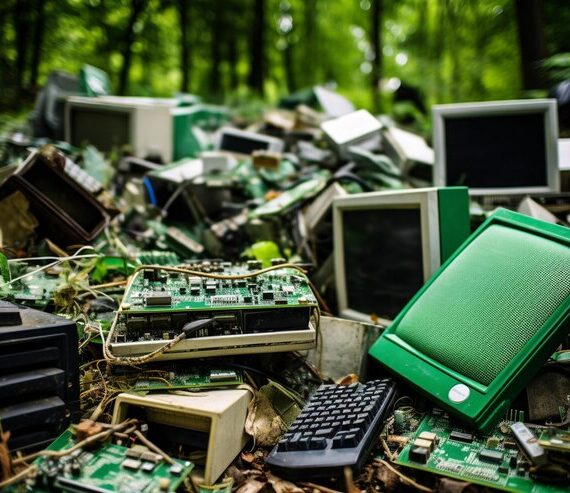
Why Should Businesses Develop an E-Waste Management Strategy?
“Earth does not belong to us; we belong to the Earth.” This powerful statement reminds us of our duty to protect the environment, a commitment that extends to how we manage the electronics that power our modern lives.
In the digital age, businesses across all sectors rely heavily on electronic equipment for their daily operations. To stay competitive and efficient, companies often upgrade their devices to keep pace with the latest industry standards. This continuous cycle of upgrading generates a significant amount of electronic waste, known as e-waste, which includes everything from outdated computers and smartphones to printers and batteries. Let’s discuss why it is so vital for businesses to have a solid e-waste management strategy.
Discover the key reasons for developing an e-waste management strategy:
Environmental Security
Electronic devices often contain dangerous substances like lead, mercury, cadmium, and brominated flame retardants. If these materials are not handled correctly, they can emerge into the ground and contaminate the soil and groundwater, posing health risks to humans and wildlife. Lead and cadmium are known neurotoxins that can affect cognitive development and kidney health, while mercury can cause nervous system disorders. A comprehensive e-waste management strategy includes collecting, sorting, and processing these toxic components to prevent environmental contamination. Moreover, recycling electronic components reduces the need to extract raw materials, mitigating environmental damage.

Regulatory Compliance
Governments worldwide are increasingly enforcing strict regulations on e-waste disposal to curb environmental damage. For example, the European Union’s WEEE Directive mandates that companies recycle a certain percentage of their electronic goods. Several states have their own regulations concerning electronic waste recycling in the United States. Without an adequate strategy, businesses risk facing penalties or litigation for non-compliance. Developing a tailored e-waste management plan ensures adherence to these legal requirements, protecting the company from fines and legal issues.
Corporate Social Responsibility
Consumers today value ethical business practices and are drawn to companies that actively promote social and environmental well-being. An e-waste management strategy showcases a business’s commitment to corporate social responsibility by demonstrating an awareness of global environmental challenges. It builds trust and fosters brand loyalty among customers, who prefer to align with businesses that reflect their values. It also signals to investors that the company is responsibly managing its resources.
Data Security
Electronic devices like computers, smartphones, and external drives hold sensitive data, including confidential business information. If improperly discarded, malicious parties can recover and exploit this data. A well-defined e-waste strategy ensures secure data destruction through degaussing, data wiping, or physical destruction of storage devices. This reduces the likelihood of data breaches that could lead to financial loss, identity theft, and reputational damage.
Cost Savings
E-waste recycling can recover valuable materials like gold, silver, copper, and platinum from old electronics. By selling these materials or using them in the production of new devices, businesses can reduce the cost of sourcing new raw materials. Furthermore, some recycling companies provide rebates or financial incentives to businesses that recycle large volumes of electronic waste, providing a potential revenue stream.
Innovation and Efficiency
When companies regularly review and update their e-waste management strategies, they often identify more efficient ways to use and reuse electronic devices. This could lead to investments in higher-quality, longer-lasting products, reducing the frequency of device turnover. Additionally, companies can innovate to develop more accessible recycled products, reducing future waste and possibly leading to industry advancements in product design and sustainability.
Enhance Brand Value
A strong e-waste management strategy can differentiate a business in a crowded market. Companies recognized for their sustainable practices tend to attract customers, investors, and strategic partners, which ultimately helps them increase market share. By highlighting their e-waste management initiatives through industry certifications, transparent reporting, and effective marketing campaigns, companies can reinforce their reputation as environmentally responsible organizations. It builds goodwill, fosters brand loyalty, and bolsters their competitive advantage in the marketplace.
Bottom Line
By implementing a sound e-waste management strategy, businesses can become responsible stewards of the environment, strengthen their brand image, save money, and reduce regulatory risks. It’s a win-win for your company and the planet. So, take charge of your e-waste and become part of the solution! Consider us your strategic partner if you want a sound e-waste management plan. We have helped hundreds of businesses develop sustainable practices that help them stay competitive and compliant.
Read Our More Blogs:
5 Innovative Technologies Revolutionizing E-Waste Recycling Industry
Impact of E-Waste on Climate Change







